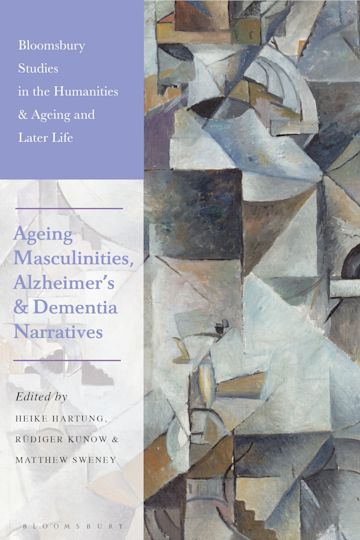In der letzten Zeit sind u.a. diese frei verfügbaren Titel erschienen:
Ageing masculinities, Alzheimer’s and dementia narratives
Heike Hartung, Rüdiger Kunow & Matthew Sweney (Hrsg.) | https://dx.doi.org/10.5040/9781350230637
In the cultural context of many western societies, Alzheimer’s disease (AD) has come to represent the dark side of longevity in the twenty-first century. While the age-old dream of a long life has become a real possibility for many people, it has simultaneously given rise to new anxieties focused on cultural fears of ‘demented’ old age. An almost inexhaustible variety of media reports, blogs and memoirs testify to today’s obsessive concern with dementia so much so that Alzheimer’s disease has become a cultural idiom for the later stages of the human life course. In expert discourse as well as in personal accounts, Alzheimer’s has produced what might be called a ‘master narrative’ or a Bildungsroman in reverse, recording the progressive un-learning of abilities and knowledges as the illness progresses. This process does not only present a major challenge to patients and caregivers, it also highlights how the illness approaches the limits of representation and narration, questioning at the same time traditional views of selfhood and human development.
While Alzheimer’s affects people indiscriminately as regarding background and social status, it is also a deeply gendered affliction. Gender difference is thus an important factor in the medical and sociological research on Alzheimer’s disease, in which the statistics which pronounce women as more at risk due to difference in longevity are set against the gender imbalance of care. Whereas older women have been more in the focus of Age Studies, because of the even more punitive cultural constructions of female old age, male caregiving for spouses with Alzheimer’s disease still has to be explored in its cultural repercussions. Therefore, the focus chosen in this volume on the specifics of dementia as a disease of ageing masculinity aims at an analysis of the gender difference in care as well as specific aspects of male identity construction in the context of mental illness from the perspective of cultural gerontology. It thus addresses a blank spot in previous research.
Bringing together insights from Masculinity Studies and Age Studies for the first time, this volume focuses on the gendered and relational perspectives in cultural representations of Alzheimer’s disease. The essays intend to initiate a new and more complex approach which looks at dementia as a disease affecting more than one person, invoking and challenging traditional as well as unconventional views of ageing masculinities. Combining a comparative and interdisciplinary approach with a gendered perspective, the essays in this volume engage with Alzheimer’s as a disease of ageing masculinities, drawing on representations of the disease in poetry and film, memoir, ethnographic and fictional narrative.
Beyond Narrative: Exploring Narrative Liminality and Its Cultural Work
Sebastian M. Herrmann, Katja Kanzler & Stefan Schubert (Hrsg.) | https://doi.org/10.14361/9783839461303
This book calls for an investigation of the ›borderlands of narrativity‹ — the complex and culturally productive area where the symbolic form of narrative meets other symbolic logics, such as data(base), play, spectacle, or ritual. It opens up a conversation about the ›beyond‹ of narrative, about the myriad constellations in which narrativity interlaces with, rubs against, or morphs into the principles of other forms. To conceptualize these borderlands, the book introduces the notion of »narrative liminality,« which the 16 articles utilize to engage literature, popular culture, digital technology, historical artifacts, and other kinds of texts from a time span of close to 200 years.
Digital lesen: Wandel und Kontinuität einer literarischen Praktik
Franziska Wilke | https://doi.org/10.14361/9783839463246
Was ist digitales Lesen? Wie gehen Lesende mit der digitalen Angebotsfülle um? Individuelle Bewältigungsmechanismen reichen oft nicht mehr aus, um diese Herausforderung zu meistern, und der Hype um digitale Medien verstellt den Blick auf ihre Tradition. Die Entwicklung stabiler Lesestrategien und Medienkompetenz erfordert daher eine systematische historische und wissenschaftliche Beschreibung des Phänomens. Aus der Synthese von Leseakttheorie, Materialitäts- und Medienforschung sowie Praxistheorie entwickelt Franziska Wilke eine Lesetypologie, die das Lesen digitaler Literatur veranschaulicht. Ihre gewonnenen Erkenntnisse nützen nicht nur Lesenden, sondern auch jenen, die es werden möchten.



